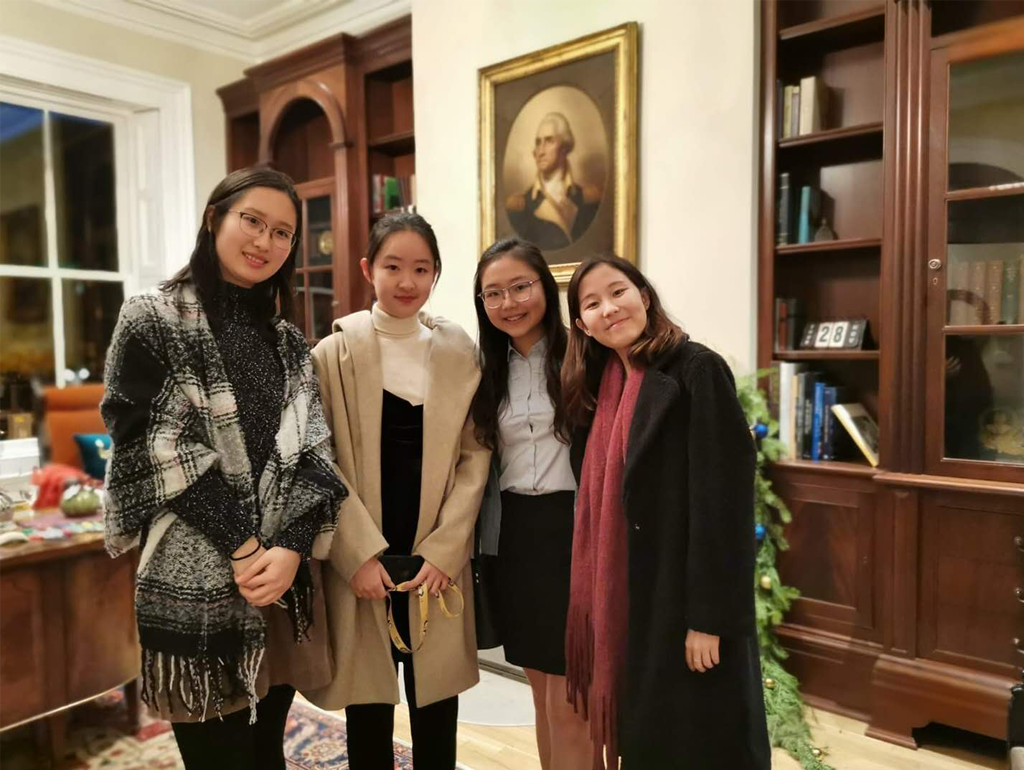Inbound Exchange Programs
The GW undergraduate exchange program fosters academic immersion via direct enrollment in our university from one of over fifty higher education exchange partners around the world. The exchange model provides an enriching cultural experience within the United States, and in particular, in Washington, D.C. As a bilateral program, welcoming students to our campus and sending GW students abroad, this program is collaboratively managed by the Office for Study Abroad and the International Services Office.
International undergraduate exchange students coming to GW work closely with the Inbound Exchange Team in the International Services Office at GW to enroll as a full-time student during the semester or academic year for which they are nominated. The GW Exchange Team provides support and assistance for students throughout their entire exchange experience.
For more information on graduate-level exchange programs, there are detailed resources available through the participating schools. If you are seeking graduate exchanges with other GW schools, please send your inquiry to oip gwu [dot] edu.
gwu [dot] edu.
About GW & The Exchange Program
Life at GW
Learn more about student life at GW, from dining and housing to sports and extracurricular activities.
Schools & Colleges
GW has 6 undergraduate schools and colleges, offering a breadth of academic opportunities across all disciplines.
Fact Sheet (PDF)
See the quick details about GW using this handy fact sheet.
- Partner Institutions
Asia
- Akita International University
- Chinese University of Hong Kong
- Chulalongkorn University
- Ewha Womans University
- Fudan University
- Hong Kong University of Science and Technology
- Korea University
- Kyoto University
- Nanyang Technological University
- Nanzan University
- National Chengchi University
- National University of Singapore
- Seoul National University
- Singapore Management University
- University of Hong Kong
- Waseda University
- Yonsei University
Europe
- Bocconi University
- Charles University
- Copenhagen Business School
- European Business School
- ESADE Law School
- ESSEC Business School
- King's College London
- Luiss University
- Maastricht University, School of Business and Economics
- Queen Mary, University of London
- Queen's University Belfast
- Royal Holloway, University of London
- Sciences Po
- Sciences Po Grenoble
- Trinity College Dublin
- Universidad Autόnoma de Madrid
- Université Paris-Dauphine PSL
- University College Dublin
- University College London
- University College Maastricht
- University of Edinburgh
- University of Iceland
- University of Leeds
- University of Navarra
- University of Zurich
- Vienna University of Economics and Business Administration
- Vrije Universiteit Amsterdam
Latin America
- Colegio de México
- Pontificia Universidad Catόlica de Chile
- Pontifícia Universidade Católica do Rio de Janeiro (PUC Rio)
- Universidad de Chile
- Universidad Torcuato di Tella
Middle East & North Africa
- Al Akhawayn University
- American University of Kuwait
- American University of Sharjah
- Reichman University (IDC Herzliya)
Oceania
- Academics for Exchange Students
At GW, faculty and students not only study the world but also work to change it. GW provides a rare combination of academic resources in an engaging university setting in the heart of Washington, D.C. Offering a wide selection of learning experiences -- from lectures and seminars to hands-on labs-- partnerships with organizations and museums, a world-class library, and state-of-the-art technology, GW's goal is to prepare students to become citizens of a global society ready to face the challenges of this still new century.
GW's Academic System
GW operates on a semester basis, with 15 weeks in each semester. The semesters are referred to as fall (late August through late December) and spring (early January through mid-May).
Students attending GW for a degree enter a degree program that focuses on a particular major or area of study. Exchange students are admitted to GW as non-degree students and can register for courses in any of the undergraduate majors.
An individual course or class can be administered in one of two ways: large lecture or small seminar.
The lecture class is frequently used at the undergraduate level, particularly for the first two years of study. Lectures are sometimes large and make discussions difficult. For this reason, a lecture will often be supplemented with a recitation or discussion session to permit discussion and/or scientific experimentation.
A seminar is the most common form of instruction at the graduate level; however seminars are also used in upper level undergraduate courses as well. These classes are generally smaller, permitting opportunities for direct student participation and closer interactions with professors.
Credits
GW uses a credit system that can be used to determine contact hours . Typically, one credit hour is equivalent to one contact hour. Undergraduate courses range from 1 to 6 credit hours, however, a typical undergraduate course is usually 3 or 4 credits.
Exchange students are required to maintain a full-time course load which equates to 12 credits. Most students will elect to take 15 credits which typically equates to 5 courses. The maximum number of credits to enroll in is 17 credits. Exchange students can enroll in a maximum of 17 credit hours as part of the tuition waiver.
Courses Available
Exchange students may enroll in any of GW’s six undergraduate schools and take undergraduate courses in any subject area. A sample of the various disciplines includes:
- American Studies
- Business Administration
- Communications
- Engineering
- History
- International Affairs
- Marketing
- Media and Public Affairs
- Political Science
Restricted Courses
Exchange students may not enroll in these courses: graduate level courses (labeled 4999 and above), courses in the fields of interior design & architecture, law, nursing, medicine, or courses in the Semester in Washington Program (denoted as PGMT). Courses in the College of Professional Studies (CPS) may be permitted on a case by case basis. Contact inbound2gw
 gwu [dot] edu (inbound2gw[at]gwu[dot]edu) if you would like to take a course at CPS.
gwu [dot] edu (inbound2gw[at]gwu[dot]edu) if you would like to take a course at CPS.Choosing Courses
Students are encouraged to consult the GW Bulletin and Schedule of Classes when preparing for their course registration.
- Admission Requirements
Undergraduate exchange students must meet the following eligibility requirements:
- Students must be an undergraduate student enrolled in a GW partner institution and nominated by their home institution.
- Students must have the equivalent of a 3.0 GPA on a 4.0 Scale
- Students must supply proof of English proficiency*. English proficiency test scores must be dated from within the past 12 months of when the document is submitted to the Office for Study Abroad. Minimum scores for TOEFL and Academic IELTS scores are listed below. For a full list of accepted English proficiency tests please see GW's undergraduate admissions website.
- Students must provide proof of financial support covering GW’s program costs.
Test Minimum Score Standard Score TOEFL TOEFL iBT: New Scale (1-6) 4.5 5 TOEFL iBT: Old Scale (0-120) 90 100 Academic IELTS Overall band score 6.5 7.5 Individual band score 5.5 Duolingo English Test Score 115 125 *Students from these schools are exempt from submitting proof of English proficiencys:
- American University of Kuwait
- American University of Sharjah
- Australian National University
- Bocconi University
- Cardiff University
- Copenhagen Business School
- Deakin University
- King's College London
- Luiss University
- Nanyang Technological University
- National University of Singapore
- Queen Mary, University of London
- Queen's University Belfast
- Royal Holloway, University of London
- Singapore Management University
- Trinity College Dublin
- University College Dublin
- University College London
- University College Maastricht
- University of Auckland
- University of Birmingham
- University of Edinburgh
- University of Exeter
- University of Hong Kong
- University of Leeds
- University of Melbourne
- University of New South Wales
- University of Sydney
- University of Technology, Sydney
English for Academic Purposes
Students who meet the university’s minimum requirements but do not meet or exceed the standard scores will be required to enroll in the English for Academic Purposes course. The English for Academic Purposes course is worth 3 credit hours and counts towards the overall credit requirement for students during their first semester. Students are notified in their admission letter if they are expected to complete this requirement. Students must obtain a C- or higher in this course to pass this course.
In addition to fulfilling the academic requirements, exchange students are expected to show proof of financial support at the time of application. Information on the costs of attending GW for a semester is indicated in the Costs section.
- Costs
GW's Cost of Attendance is published annually by the Office of Student Financial Assistance.
- Application Process
- Be nominated by your school for exchange.
- When your nomination has been processed, the Exchange Team will email you with application instructions
- Complete the online exchange application and submit to the Exchange Team through ISO Gateway.
- Once accepted, the Exchange Team will send immigration documents to your school.
- Apply for the J-1 visa.
- Arrive in the US for orientation week with the Exchange Team.
For questions regarding the undergraduate exchange program, please contact inbound2GW
 gwu [dot] edu (inbound2GW[at]gwu[dot]edu).
gwu [dot] edu (inbound2GW[at]gwu[dot]edu).
Exchange Student Programming
The Office for Study Abroad offers specific programming to support exchange students during their time at GW.
Orientation
Immigration Support
The International Services Office (ISO) and Office for Study Abroad work together to provide immigration advising and support for exchange students on a J-1 visa. The ISO serves as the primary administrative, programming and immigration advising office for the GW international community.
Exclusive Events
Being a GW exchange student grants you access to over 500 student clubs and organizations, as well as special access to exchange student and international student focused events and workshops.
Information for Partners
- Nomination Procedures
Before each semester, the Office for Study Abroad notifies partners regarding the number of exchange spots available and then the Exchange Coordinator sends a Call for Nominations. In order for exchange students to access the online application system, partners must complete and submit an online form by the nomination deadline. A link to the online form will be included in the Call for Nominations. When the admission cycle officially opens, the Exchange Team will process nominations and email students with application instructions.
- Application Procedures
In the online application system, ISO Gateway, students can view a list of application requirements for admission.
Exchange students are required to submit specific documents to apply. Each of the items must be submitted by the applicant online through ISO Gateway.
- GW Exchange Program Application
- Upload the following documents:
- Scanned copy of the Biographical Page of Passport (passport must be valid through a period of 6 months AFTER departure from the GW Exchange or admission will not be processed)
- Scanned copy of past U.S. Visas (does not include ESTA travel visas; only applicable to students who have been issued a U.S. visa within the past 5 years)
- Scanned copies of Official Transcript(s) from all universities attended (All transcripts must clearly state the student's Grade Point Average)
- Scanned copy of TOEFL, IELTS, PTE Academic, or Duolingo English Test score reports to satisfy the Proof of English Language Competency Requirements*
- Scanned copy of Financial Certificate
- Scanned copy of Proof of Funding
*Minimum and standard scores can be found in the Admission Requirements section. Students from the following schools are exempt from submitting proof of English proficiency:
- American University of Kuwait
- American University of Sharjah
- Australian National University
- Bocconi University
- Cardiff University
- Copenhagen Business School
- Deakin University
- King's College London
- Luiss University
- Nanyang Technological University
- National University of Singapore
- Queen Mary, University of London
- Queen's University Belfast
- Royal Holloway, University of London
- Singapore Management University
- Trinity College Dublin
- University College Dublin
- University College London
- University College Maastricht
- University of Auckland
- University of Birmingham
- University of Edinburgh
- University of Exeter
- University of Hong Kong
- University of Leeds
- University of Melbourne
- University of New South Wales
- University of Sydney
- University of Technology, Sydney
- Acceptance Procedures
Exchange students who submit a complete application by the deadline can anticipate receiving a notification of admission approximately two to three weeks after the deadline. If admitted, they will receive detailed information regarding:
- Visa Documentation.
- Registering for Courses. Once accepted as an exchange student, students will receive more detailed information about exchange student registration procedures. Students receive assistance in the course registration process from the Exchange team. For more information on available courses at GW and a sample of course descriptions please see the GW Schedule of Classes.
- On-Campus Housing.
- Health Insurance and Required Immunizations.
- Mandatory Orientation. The Exchange team provides a mandatory orientation for all exchange students. This specialized orientation gives exchange students the information necessary to succeed at GW and introduces them to campus services, important offices and academics.
If you have any questions, please contact the Exchange team at inbound2GW
 gwu [dot] edu (inbound2GW[at]gwu[dot]edu).
gwu [dot] edu (inbound2GW[at]gwu[dot]edu).







